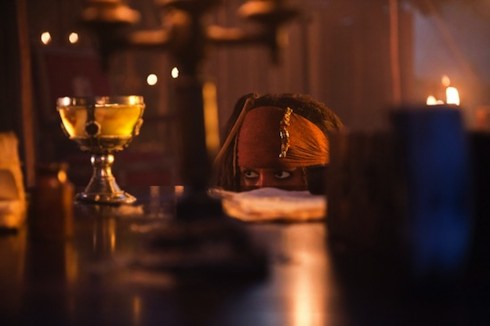When the first Pirates of the Caribbean film came out, Johnny Depp gave an interview where he admitted that he loved playing Jack Sparrow so much that he would continue to don the dreadlocks and eyeliner as long as they kept creating scripts that he liked. That may have caused a few groans, but it was still an interesting prospect: what if these films became a serial? Could Depp carry that many films across however many decades they chose to run with him?
As if you even had to ask, mate—he’s Captain Jack Sparrow. Savvy?
While the initial Pirates trilogy was wildly successful in the monetary sense, there were still plenty of nay-sayers who were not pleased with the plotlines of Dead Man’s Chest and At World’s End. It’s understandable; if you were enjoying the all-out romp of the first film, the dark twists and frenzied plotting by every single character in the following two movies might have worn you down. Whether or not you fall into this category, the benefit of On Stranger Tides is that it’s never bogged down by the backstory of those first three films. Forget Will and Elizabeth—they’ve moved on with their lives. Tia Dalma had her day. Norrington and Governor Swann are gone. We’re here for Jack… and Barbossa. (Don’t lie, you’ve always been in it for Barbossa.)
The opening sequence offers exactly what we should get from these movies: a highly improbable escape followed by an even more improbable chase scene and two brilliant cameos (one that you probably were not expecting, which makes it that much sweeter). Everyone is masterfully over the top, and clearly very comfortable there, from Richard Griffiths foppish turn as King George to Óscar Jaenada’s comically straight-laced, tight-lipped Spaniard. And in the middle of it all, Jack is doing what he does best—making himself look like a complete fool despite the fact that some semblence of a plan must be bubbling away on the next tier of his brain.

Getting a closer look at Geoffrey Rush’s Captain Barbossa provides us with one of the most interesting turns in the series to date. His good humor, his bizarre sense of honor and his innate ability to be the best commander of any ship he sets foot on (oh, I could make such a mean joke there, but it would be a spoiler) is enough to make this movie worth watching. Spending half of his time on screen interacting with Jack delivers both of their performances on a level that makes you wonder why someone doesn’t up and create the buddy-pirate genre to replace buddy-cops.
This is all without getting to the mermaids.
The Pirates movies are in a unique place to draw from every legend and piece of folklore linked to pirate mythos without calling into question whether or not these things should co-exist. They have created a universe much like the one Indiana Jones occupies, drawn from those pre-film serialized shorts back in the 1930s and 40s, a universe where everything belongs. Magic, religion, history, mythology, and more voodoo and machinations of fate than you can shake a feathered rainstick at. As a result, the mermaids of the Pirates universe feel much more like those from Barrie’s Neverland than your typical Disney fair, and their powers are closely linked the ones you find in siren tales. In the end, they are ethereal, frightening, and a lot of fun.
Stranger Tides is by no means a flawless effort; there is definitely more than one scene where it seems as though the screenwriters forgot the rule about two characters just sitting and talking exposition for three solid minutes (but the actors remember it, which make those scenes even more awkward to watch). Ian McShane is not particularly memorable as Blackbeard, and through no fault of his own; he simply isn’t given that much to work with dialogue-wise. Penelope Cruz’s character had the ability to be the real lady pirate that many fans were searching for in Keira Knightley’s Elizabeth Swann, with all selfishness and hunger for glory that entails; instead, she becomes your standard lost little girl with male abandonment issues. Perhaps they should have just stuck to what they do best, because they do it so very well.
But in the end, it all comes down to Jack and his (mostly) faithful first mate Gibbs. While Jack spends most of this film without his famous leather tricorn hat—three guesses as to what that signifies within the narrative—the next film promises a return of sorts for our favorite captain. Let’s hope he gets a worthy one. Instead of making these films out to be more than they are and getting disappointed by the lack of “newness” they possess, I suggest we start thinking of Captain Jack as a whimsical staple in our lives—one who will continue to entertain us for years to come.
Emmet Asher-Perrin is keeping Jack’s hat until he needs it. You can bug her on Twitter and read more of her work here and elsewhere.










